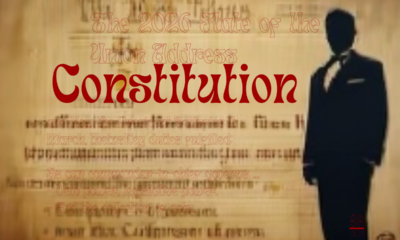Civilization
“It Ain’t the Dying that’s Scary … It’s the Killing”
Those who come home from war have many varieties of horror stories, and many report that killing in combat scares them more than death.

This is an excerpt from Carl Cannon’s foreword to River City One: A Novel (Simon and Schuster, 2023) by John J. Waters. What follows is part two in a two-part series on how Americans come home from war. Part one can be read here.
Standing on the cliff at Pointe du Hoc sixty years after D-Day, I encountered a German tourist at the same spot. He stepped aside in deference to me, an obvious American, and instructed his family to do the same. I had been gazing out at the Normandy coastline while envisioning the seven thousand ships in the Allied armada that had come to liberate a continent. What this man, who was not even alive when Hitler wreaked havoc on Europe, was thinking I can only imagine. The words that came to my mind were from Ulysses Grant at Appomattox. As Robert E. Lee surrendered, Grant found himself trying to reconcile his respect for the bravery of the Confederates, including Lee, with contempt for the depraved institution that had induced them to take up arms against their own nation in the first place. It was a cause, Grant wrote, that was “one of the worst for which a people ever fought, and one for which there was the least excuse.”
As twenty-first century America undergoes one of its periodic reckonings on race, we are reexamining slavery’s legacy. Yes, it’s true that Jim Crow was a conscious attempt to maintain white supremacy in the South. But that’s not all. I believe it was also driven by the same motivation that fueled the odious “Lost Cause” narrative as well as hagiographic books ranging from Gone with the Wind to Lee’s Lieutenants: namely, a revisionist impulse to show all that killing and suffering hadn’t been for nothing. This is not to say that the battle-tested Union men who marched with Grant—or those in the Greatest Generation, for that matter—didn’t pay any psychic price. We know better.
More than fifty years after the fact, a onetime American soldier named Earl Crumby who earned a Purple Heart in the Battle of the Bulge, wept while describing for writer Tim Madigan the kind of details veterans do not describe to children. Crumby’s wife of many decades had died a few years earlier, but his tears that day weren’t for her. “As dearly as I loved that woman, her death didn’t affect me near as much as it does to sit down here and talk to you about seeing those young boys butchered during the war,” he told Madigan. “It was nothing but arms and legs, heads and guts. You’d think you could forget something like that. But you can’t.”
Other writers have explored not just what combat veterans have to see, but also what they have to do. In My Dog Skip, Willie Morris’ autobiographical coming-of-age story about growing up in Mississippi, Willie’s next door neighbor Dink Jenkins comes back from the fighting in Europe a shell of his former self. Dink tells young Willie, “It ain’t the dying that’s scary, boy, it’s the killing.” Willie’s father is sympathetic. He lost a leg in the Spanish Civil War “and a piece of his heart” in the process. What all these characters I’ve mentioned have in common—and what “John Walker” does in the pages that follow—is reveal that when they come home from war, they must learn to live again as a civilian.
America, the nation that perfected the idea of the “citizen-soldier,” now has an all-volunteer military, which has evolved into a professional fighting force with its own subculture. And a self-perpetuating one. Historian Andrew Bacevich, a West Point man who commanded a combat platoon in Vietnam, has pointed out that the lack of a military draft has made it far too easy for politicians who never heard a shot fired in anger to send Americans into battle zones. The makeup of today’s armed forces also places an undue burden on the small minority of families willing to fight democracy’s wars. Multiple deployments in Iraq and Afghanistan were a curse to many of these men. But not only a curse.
For some, the “War on Terror” was more than a calling; it became a lifestyle. Then it was over. Saving the world from evil makes most stateside jobs seem mundane by comparison. What are people supposed to do with themselves when their main purpose in life has come and gone before they’ve turned thirty-five? “Find love, raise children, pursue a meaningful career” would be society’s answer. The warrior’s burden has never made it that simple.
Two Spartans survived the famous Battle of Thermopylae: One of them, Pantites, was dispatched to warn Sparta’s allies. He returned too late to fight with King Leonidas and the three hundred Spartans martyred by King Xerxes’ massive Persian army after betrayal by a Greek shepherd. Out of shame, Pantites hanged himself. The other survivor, Aristodemus, had been excused from the action because of an eye infection, but was still shunned by the Greeks for his supposed cowardice. He atoned by giving his life while fighting furiously—and recklessly—the following year against the Persians at the Battle of Plataea.
The modern world is less dramatic, if no less tragic.
Legendary Navy SEAL and decorated Iraq combat veteran Chris Kyle was fatally ambushed at a Texas shooting range along with a friend named Chad Littlefield, a man with a passion for assisting veterans. As it happened, the mentally ill and drug-impaired veteran they were trying to help shot them in the back. Almost all fighters in the field long for hearth and home. When they get there, they must figure out how to live again without the constant rush of adrenaline. If going to war makes them feel like heroes, then it stands to reason that the very act of returning to civilian life can make even a reflective person worry that they’ve abandoned the mission. To stave away the demons, some of them write. And those of us who give up a good seat on an airplane, or stand and cheer for veterans and their families at the ballpark, or who tell men and women in uniform, “Thank you for your service,” can do more. For starters, we can read their memoirs and their novels. And after doing so, we can look with deep skepticism on elected officials who are too eager to send young Americans off to war.
This article was originally published by RealClearHistory and made available via RealClearWire.
Carl M. Cannon is the Washington Bureau Chief of RealClearPolitics and Executive Editor of RealClear Media Group. Carl is a past recipient of the Gerald R. Ford Journalism Prize for Distinguished Reporting and the Aldo Beckman Award, the two most prestigious awards for White House coverage. Previous positions include executive editor of PoliticsDaily.com, D.C. bureau chief for Reader's Digest and White House correspondent for both the Baltimore Sun and National Journal. He was a 2007 fellow-in-residence at Harvard University's Institute of Politics, a past president of the White House Correspondents’ Association, and is a published author.
-

 Civilization5 days ago
Civilization5 days agoMaduro’s Capture: U.S. Foreign Policy in Latin America
-

 Guest Columns5 days ago
Guest Columns5 days agoA Bipartisan Fix for the Prescription Drug Market
-

 Civilization3 days ago
Civilization3 days agoA Better U.S. Strategy for Greenland Than Annexation
-

 Education3 days ago
Education3 days agoIgnoring the Science: The Curious Case of Cell Phone Bans
-

 Guest Columns4 days ago
Guest Columns4 days agoWaste of the Day: Thousands of Earmarks in Illinois State Budget
-

 Education4 days ago
Education4 days agoA Solid Core Enlivens Free Speech and Viewpoint Diversity
-

 Executive2 days ago
Executive2 days agoWaste of the Day: Utah University Trustees Don’t Know Their Job
-

 Civilization4 days ago
Civilization4 days agoEnd the Filibuster – Or Stop Pretending To Govern












